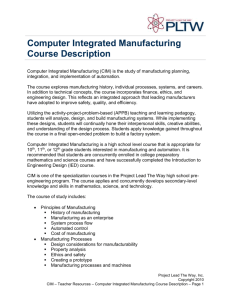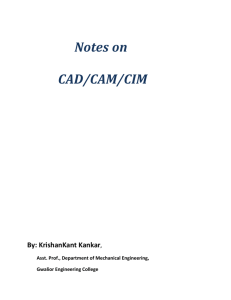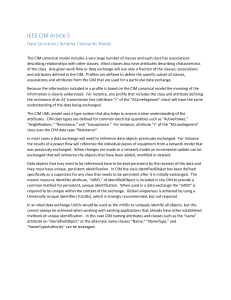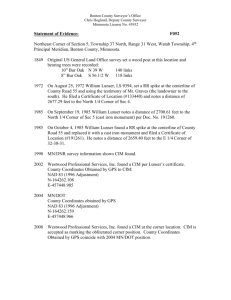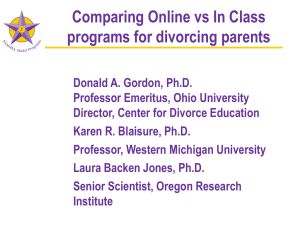Syllabus - Santa Barbara City College
advertisement
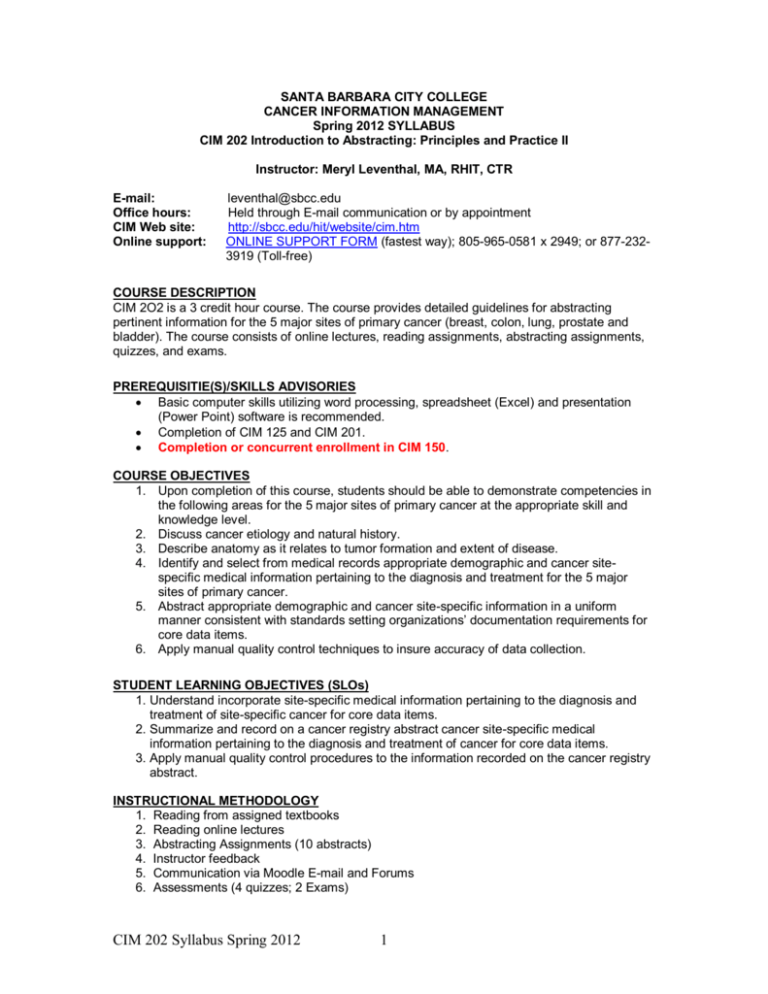
SANTA BARBARA CITY COLLEGE CANCER INFORMATION MANAGEMENT Spring 2012 SYLLABUS CIM 202 Introduction to Abstracting: Principles and Practice II Instructor: Meryl Leventhal, MA, RHIT, CTR E-mail: Office hours: CIM Web site: Online support: leventhal@sbcc.edu Held through E-mail communication or by appointment http://sbcc.edu/hit/website/cim.htm ONLINE SUPPORT FORM (fastest way); 805-965-0581 x 2949; or 877-2323919 (Toll-free) COURSE DESCRIPTION CIM 2O2 is a 3 credit hour course. The course provides detailed guidelines for abstracting pertinent information for the 5 major sites of primary cancer (breast, colon, lung, prostate and bladder). The course consists of online lectures, reading assignments, abstracting assignments, quizzes, and exams. PREREQUISITIE(S)/SKILLS ADVISORIES Basic computer skills utilizing word processing, spreadsheet (Excel) and presentation (Power Point) software is recommended. Completion of CIM 125 and CIM 201. Completion or concurrent enrollment in CIM 150. COURSE OBJECTIVES 1. Upon completion of this course, students should be able to demonstrate competencies in the following areas for the 5 major sites of primary cancer at the appropriate skill and knowledge level. 2. Discuss cancer etiology and natural history. 3. Describe anatomy as it relates to tumor formation and extent of disease. 4. Identify and select from medical records appropriate demographic and cancer sitespecific medical information pertaining to the diagnosis and treatment for the 5 major sites of primary cancer. 5. Abstract appropriate demographic and cancer site-specific information in a uniform manner consistent with standards setting organizations’ documentation requirements for core data items. 6. Apply manual quality control techniques to insure accuracy of data collection. STUDENT LEARNING OBJECTIVES (SLOs) 1. Understand incorporate site-specific medical information pertaining to the diagnosis and treatment of site-specific cancer for core data items. 2. Summarize and record on a cancer registry abstract cancer site-specific medical information pertaining to the diagnosis and treatment of cancer for core data items. 3. Apply manual quality control procedures to the information recorded on the cancer registry abstract. INSTRUCTIONAL METHODOLOGY 1. Reading from assigned textbooks 2. Reading online lectures 3. Abstracting Assignments (10 abstracts) 4. Instructor feedback 5. Communication via Moodle E-mail and Forums 6. Assessments (4 quizzes; 2 Exams) CIM 202 Syllabus Spring 2012 1 REQUIRED TEXTBOOKS/MATERIALS 1. Cancer Reporting in California, Abstracting and Coding Procedures for Hospitals, Volume 1, 11th Edition. California Cancer Registry. (Use online HTML version-click on the Volume 1 link on the Moodle CIM 202 home page). 2. Collaborative Staging Manual and Coding Instructions, Version 2.0, NIH Publication Number 04-5496, U.S. Department of Health and Human Services, NIH, NCI. (Link to online manual on the Moodle CIM 202 home page) 3. Fritz, A. The Cancer Registry CASEbook: Coding, Abstracting, Staging, Exercises, Volume I: Introductions and Five Major Sites and Volume II: Challenging Sites: Head and Neck, Female Genital, CNS, Lymphoma. RECOMMENDED TEXTBOOKS/MATERIALS 1. Percy’s International Classification of Diseases for Oncology (WHOP) ISBN: 9241545348 th 2. Fleming’s, AJCC Cancer Staging Manual. ISBN: 0387952713. 7 edition 3. Kapit, Anatomy Coloring Book. ISBN: 0805350861 4. SEER Program Self-Instructional Manual For Tumor Registrars, 2nd edition, Book 4 (available on CD from SEER) METHODS OF EVALUATION Homework Abstracts 5 @ 10 points each= 50 points Project Abstracts 5 @ 20 points each= 100 points Quizzes 4 @ 10 points each= 40 points Exams 2 @ 55 points each= 110 points Total points possible 300 points CALCULATION OF GRADES Grades will be calculated by placing the total points earned over the total points available. After conversion to a percentage, a letter grade will be assigned based on the grading scale. Grades may be accessed through the Grades ( ) link in Moodle. “Grading” abstracts is somewhat subjective. In “real life”, your abstracts will be “graded” in terms of data quality by a state registry and/or a central registry and/or SEER and/or NPCR and/or the ACoS COC. For this course, the abstracting assignments will be evaluated on your ability to: Follow instructions for completing and submitting the abstracts Follow cancer reporting guidelines per Cancer Reporting in California, Volume 1, 11th edition Follow general abstracting guidelines presented in CIM 201 and CASEbook Volume I Follow site-specific abstracting guidelines presented in CASEbook Volume II GRADING SCALE 90-100% 269-300 points 80-89% 239-268 points 70-79% 209-239 points 60-69% 179-208 points Below 60% Below 179 points A B C D F The minimum grade acceptable for this course is a C. COURSE POLICIES Attendance There are no attendance requirements or study groups for CIM 202. Students are advised to log on AT LEAST ONCE A WEEK. HIT/CIM ATTENDANCE POLICY: Click on the link on the Moodle CIM 202 homepage to read the HIT/CIM Departmental attendance policy. CIM 202 Syllabus Spring 2012 2 Course Content The course content is displayed in the center block on the Moodle CIM 202 homepage below the Orientation Activities and Volume 1 links. There are 7 numbered lesson blocks consisting of 1 review lesson, 4 site-specific lesson modules, and 2 exams. To view the lesson content, click on each of the activities listed. Students are expected to complete all activities provided in the lesson block. The activities MUST be completed in the order in which they appear in the lesson module. Detailed instructions for completing the lesson modules are posted in the Course Navigation link. Failure to follow these instructions may result in no credit or a reduction in credit for the assignment or assessment. Due dates for all course deliverables (assignments, quizzes and exams) are specified in the Course Calendar. All course deliverables are due on Sunday except for Exam 2 (due date is Saturday). Assignments Assignments should be submitted through the Assignment link ( ) in Moodle. Due dates for assignments are posted in the Course Calendar. Students must submit the assignment within the availability dates specified in the Course Calendar unless prior arrangements are made and approved by the course instructor. Students are required to keep a copy of all submitted assignments. All assignments MUST be saved with the file extension .rtf. Quizzes and Exams Quizzes and exams are accessed through the Quizzes link ( ) in Moodle. Both are timed assessments. Students are allowed 30 minutes to complete each quiz (completed using completed lesson homework abstract) and 75 minutes for exams (closed book/closed notes/no internet resources). Please do not print the quizzes or exams, save them electronically or otherwise keep a copy of the quiz or exam questions.. Availability dates for quizzes and exams are specified in the Course Calendar. Students must take each quiz and exam during the availability dates specified in the Course Calendar unless prior arrangements are made and approved by the course instructor. Late Policy There will be no credit for late submissions of any course deliverables (lessons, assignments, discussion forums, quizzes and exams). Due dates for all course deliverables are posted in the Course Calendar. All students are responsible for monitoring and adhering to the Course Calendar as posted unless prior arrangements have been made with the instructor. Computer problems do occur so if it is your habit to work up until an assignment or exam deadline, do so at your own risk. All students should have a “back-up” computer plan in the event of hardware, software or technical difficulties unrelated to the SBCC system that can be invoked in a timely manner. The “back up” computer may be through another reliable source such as the workplace, public library, friends, etc. Otherwise the student will run the risk of submitting a late assignment and not receiving credit for it or missing an important exam. “Technical problems” are not an excuse for missing an exam or other due date. Lesson Evaluation Each lesson module has a five-question lesson evaluation, accessible through the Feedback link ( ). Students are requested to provide the instructor with constructive feedback as to their success and/or difficulties with the lesson. The lesson evaluations are not required, however constructive feedback from students is most appreciated as it allows for adjustments to the course content and delivery. CIM 202 Syllabus Spring 2012 3 Outside Assistance All course deliverables must be the result of the individual student’s effort. A word of caution about seeking assistance outside the course: cancer registrar colleagues are not aware of specific course guidelines. They may answer your questions correctly, but their answer may not be correct in the context of this course. Questions about the course content/course deliverables must be directed to the course instructor not to other students, other CIM faculty, or other cancer registry professionals. Assignments and assessments that appear to be the result of a collaborative effort will not be accepted for credit. Accreditation The Cancer Information Management Program at Santa Barbara City College is accredited by the National Cancer Registrars Association's Formal Education Program Review Committee. Any complaints about the CIM program that cannot be resolved through the usual SBCC channels may be submitted in writing to: Chair, Formal Education Review Committee National Cancer Registrars Association 1340 Braddock Place Suite 203 Alexandria, VA 22314 LINKS TO SBCC POLICIES Students with Disabilities Netiquette (Online Etiquette) Academic Integrity Policy Standards of Student Conduct Plagiarism Online College Concerns Dropping Classes CIM 202 Syllabus Spring 2012 4 ABOUT YOUR INSTRUCTOR Meryl Leventhal has more than 35 years experience in health information management including over 20 years in the cancer registry profession. She has worked in American College of Surgeons Commission on Cancer approved hospital programs and in a regional/central cancer registry. Meryl graduated from the State University of New York at Albany, receiving a Bachelor of Arts degree in French cum laude in 1972, and the University of Michigan, receiving a Master of Arts degree in Library and Information Science and a Certificate in Medical Librarianship in 1973. Upon completion of her formal education, she began her career in health data management. From 1975-1995, Meryl worked for Kaiser Permanente Southern California as a health data analyst, cancer registrar and regional coordinator of the cancer registries. She sat for national certification exams and became an accredited registered technician (now RHIT) in 1976 and a Certified Tumor Registrar (CTR) in 1989. In 1995, Meryl joined the staff of the Los Angeles Cancer Surveillance Program (CSP), at the Keck School of Medicine of the University of Southern California where she serves as Data Collection Manager. The CSP is one of the 10 regional registries that comprise the California Cancer Registry (CCR) and a SEER region, She has been an instructor and co-director of the USC Cancer Registrar Training Program (CRTP) since 1996. In 2000, Meryl joined Santa Barbara City College as an adjunct instructor in the HIT/CIM department. As one of the founding faculty of SBCC’s CIM Program, she developed the curriculum for the introductory abstracting courses and has served as the course instructor since the program’s inception. The CIM Program’s founding faculty received NCRA’s Education Award in 2001. Meryl is a member of the American Health Information Management Association (AHIMA), the California Health Information Management Association ( CHIA) and an active member of the North American Association of Central Cancer Registries (NAACCR), the National Cancer Registrars Association (NCRA), the California Cancer Registrars Association (CCRA) and the Southern California Cancer Registrars Association (SCCRA). She has served as Education Committee Chair for NCRA, CCRA and SCCRA and Program Chair for CCRA and SCCRA. Meryl is a past President of SCCRA. In 2002, Meryl was awarded the CCRA Distinguished Service Award. Meryl is a contributing author for The Cancer Registry CASEbook: Coding, Abstracting, Staging Exercises, Volumes I and II, textbooks designed specifically for use in CIM 150 and CIM 201/202. She is a member of the Cancer Surveillance Outcomes Research Team (CanSORT), a multidisciplinary group of investigators based at the University of Michigan, which investigates various dimensions of quality of cancer care in diverse populations. CIM 202 Syllabus Spring 2012 5
